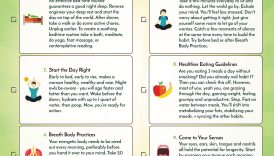Exploring the Link Between Happiness and Good Living Health

Definition of Happiness and Good Living Health
Happiness is often described as a state of well-being characterized by feelings of joy, contentment, and fulfillment. It’s important to note that happiness is subjective; what brings joy to one person might not resonate the same way with another. Good living health, on the other hand, refers to a holistic state where physical, mental, and social well-being are balanced, allowing individuals to lead fulfilling lives. While these concepts seem distinct, their intersection plays a crucial role in how we experience life. For instance, people who engage in activities that evoke joy often report better overall health.
- Exploring the Link Between Happiness and Good Living Health
- Definition of Happiness and Good Living Health
- Importance of Exploring the Link
- The Mind-Body Connection
- Psychological Factors Influencing Health and Happiness
- Impact of Physical Well-being on Mental Health
- Factors Affecting Happiness Levels
- Social Relationships and Support System
- Role of Personal Fulfillment and Purpose
- Healthy Habits for a Happier Life
- Nutrition and Its Influence on Mood
- Importance of Regular Physical Activity
- Mental Well-being and Stress Management
- Coping Strategies for Managing Stress
- Mindfulness and Its Benefits for Overall Health
- Impact of Happiness on Physical Health
- Positive Effects of Happiness on the Body
- Link Between Happiness and Improved Immune Function
- Longevity and Happiness
- Research on Longevity and Positive Emotions
- Strategies for Increasing Happiness Levels
- Happiness and Chronic Disease Management
- How Positive Emotions Affect Chronic Disease
- Integrating Happiness Practices into Healthcare
- Promoting Happiness and Health in Daily Life
- Tips for Cultivating a Positive Mindset
- Creating a Healthy Environment for Wellness
- Conclusion
- Recap of the Relationship Between Happiness and Good Health
- Steps Towards Achieving a Balanced and Fulfilling Life
Importance of Exploring the Link
Understanding the link between happiness and good health is essential for a thriving life. Research shows:
- Happy individuals tend to engage more in health-promoting behaviors.
- Happiness can lead to lower stress levels, minimizing the risk of chronic illnesses.
- Emotional well-being can enhance lifestyle choices, leading to better nutrition and exercise.
By exploring this connection, we can uncover ways to cultivate happiness that ultimately support better health outcomes, creating a win-win scenario for all.
The Mind-Body Connection
Psychological Factors Influencing Health and Happiness
The relationship between our mental state and physical health is fascinating and profound. Psychological factors, such as stress, anxiety, and emotional resilience, can significantly influence our overall happiness and health. For instance, individuals who maintain a positive outlook during challenging times often experience:
- Lower levels of stress hormones: This can lead to reduced risk of heart disease.
- Enhanced immune function: Positivity can boost immune responses, helping the body fend off illnesses.
Consider a personal anecdote: a friend once shared how practicing gratitude transformed her outlook on life. She noticed that focusing on positive aspects improved her mental health and even helped reduce her chronic migraines.
Impact of Physical Well-being on Mental Health
Conversely, our physical well-being plays a vital role in shaping our mental state. Engaging in regular exercise has been shown to:
- Release endorphins: These natural chemicals boost mood and alleviate feelings of depression.
- Improve sleep quality: Better rest can lead to enhanced cognitive function and emotional stability.
For example, someone who incorporates physical activity into their routine may discover that they not only feel stronger but also experience a more optimistic outlook on life. By fostering both psychological health and physical well-being, individuals can truly unlock the potential for lasting happiness.
Factors Affecting Happiness Levels
Social Relationships and Support System
When it comes to happiness, the role of social relationships cannot be overstated. Strong connections with family, friends, and the community contribute significantly to overall life satisfaction. Positive interactions can lead to:
- Increased feelings of belonging: Being part of a group fosters emotional security.
- Higher resilience: Support networks can help individuals cope with life’s challenges.
For instance, consider a time when a supportive friend stepped in during a tough period. That presence alone might have transformed a challenging moment into a manageable experience, reinforcing the necessity of social ties.
Role of Personal Fulfillment and Purpose
Equally important is finding personal fulfillment and a sense of purpose. Engaging in meaningful activities can elevate happiness levels dramatically. Research suggests that people who pursue goals aligned with their values often experience:
- Greater motivation: Passion fuels energy and commitment.
- Improved self-esteem: Achieving goals boosts confidence and creates a sense of achievement.
Take, for example, someone who volunteers regularly. Not only do they contribute positively to their community, but they also discover joy in giving, adding depth and meaning to their lives. Cultivating strong relationships and seeking personal fulfillment create a powerful foundation for lasting happiness.
Healthy Habits for a Happier Life
Nutrition and Its Influence on Mood
After establishing how social relationships and personal purpose contribute to happiness, it’s essential to consider how nutrition plays a role in shaping our moods. What we eat significantly impacts our emotional well-being. For example:
- Foods rich in omega-3 fatty acids, such as salmon and walnuts, can boost serotonin levels, often nicknamed the “happiness hormone.”
- Fruits and vegetables are high in antioxidants, which can reduce inflammation and improve brain function.
A personal story comes to mind: a friend of mine noticed a dramatic change in her mood when she switched from a fast-food-heavy diet to incorporating more whole foods. She felt more energized and positive, showcasing how nutrition can lift spirits and enhance overall happiness.
Importance of Regular Physical Activity
In conjunction with a healthy diet, regular physical activity is paramount for fostering happiness. Exercise releases endorphins, known as the body’s natural mood lifters. Joining a local running club or taking dance classes can:
- Boost energy levels: Increased stamina translates to better productivity and a more positive outlook.
- Encourage social interaction: Group activities provide an avenue for forming friendships and support networks.
Reflecting on my own experience, I find that my mood always improves after a good workout. Combining proper nutrition with regular exercise creates a powerful synergy that can lead to a happier, more fulfilling life.
Mental Well-being and Stress Management
Coping Strategies for Managing Stress
Having laid the foundation of healthy habits, it’s vital to address mental well-being and effective stress management techniques that enhance happiness. Life inevitably brings stress, but how we cope with it can make all the difference. Some useful strategies include:
- Deep breathing exercises: Taking a moment to focus on breathing can immediately reduce tension.
- Time management techniques: Prioritizing tasks helps prevent the overwhelming feeling of having too much on your plate.
- Engaging in hobbies: Whether it’s painting, gardening, or reading, dedicating time to what you love can provide a refreshing escape.
For instance, I found that taking short breaks during my workday to practice deep breathing significantly improved my mood and focus.
Mindfulness and Its Benefits for Overall Health
Another powerful tool for stress management is mindfulness. By practicing mindfulness, individuals can cultivate a greater sense of awareness and presence, leading to various benefits, such as:
- Reduced anxiety: Mindfulness helps in identifying stressors and managing reactions.
- Improved emotional regulation: It enhances one’s ability to respond to situations with a calm and balanced perspective.
In my experience, integrating mindfulness meditation into my morning routine transformed how I approach daily challenges. With consistent practice, I discovered not only increased resilience to stress but also an overall uplift in my mood. By adopting these strategies, individuals can significantly enhance their mental well-being and ultimately improve their quality of life.
Impact of Happiness on Physical Health
Positive Effects of Happiness on the Body
Building on the importance of mental well-being and stress management, it’s intriguing to explore how happiness directly impacts physical health. Joy and positivity don’t just feel good—they also yield measurable benefits for the body. For instance, research has shown that happy individuals often experience:
- Lower blood pressure: Happiness can counteract stress-induced spikes, promoting cardiovascular health.
- Reduced risk of chronic diseases: A cheerful disposition can lead to healthier lifestyle choices, reducing the likelihood of conditions such as diabetes and heart disease.
I recall a family member who, after adopting a more positive outlook on life, saw remarkable improvements in her health, including better energy levels and fewer instances of illness.
Link Between Happiness and Improved Immune Function
Moreover, happiness plays a vital role in enhancing immune function. Studies indicate that positive emotions can bolster the immune system, making it more effective in fighting off infections. Some notable benefits include:
- Increased production of antibodies: Happier people often have higher levels of antibodies that protect against diseases.
- Lower incidence of illness: Individuals with a positive mindset may experience fewer colds and infections.
For example, after joining a community wellness group that emphasized joy and connection, I noticed not just a lift in spirits but a dramatic drop in my usual seasonal allergies. Recognizing this profound link between happiness and physical health encourages individuals to prioritize joy as part of their overall wellness journey.
Longevity and Happiness
Research on Longevity and Positive Emotions
Transitioning from the significant link between happiness and physical health, an exciting area to explore is the correlation between happiness and longevity. Research suggests that positive emotions may contribute to a longer life. Studies have indicated that individuals who report higher levels of happiness often enjoy:
- Longer life spans: Happiness has been associated with a reduced risk of death from various causes, including heart disease.
- Lower stress levels: Positive emotions can mitigate the harmful effects of stress on the body.
A striking example is the studies conducted in blue zones—regions known for their high number of centenarians. These areas typically emphasize social connections and fulfillment, underscoring the role of happiness in longevity.
Strategies for Increasing Happiness Levels
To capitalize on the benefits of happiness, incorporating effective strategies into daily life is essential. Consider these practices:
- Cultivating gratitude: Keeping a gratitude journal can shift focus toward the positive aspects of life.
- Building connections: Strengthening relationships through regular social activities can enhance emotional support.
- Pursuing hobbies: Engaging in enjoyable activities fosters a sense of accomplishment and joy.
Reflecting on my journey, adopting these strategies helped me boost my mood and create a more fulfilling life. By making happiness a priority, not only can we enhance our overall well-being, but we can also potentially extend our years on this planet. Embracing happiness is not just a feel-good endeavor; it’s a pathway to a longer, healthier life.
Happiness and Chronic Disease Management
How Positive Emotions Affect Chronic Disease
Continuing from our discussion on happiness and longevity, it’s crucial to consider how positive emotions influence chronic disease management. Those grappling with chronic illnesses often face emotional challenges, but maintaining a positive outlook can have tangible effects on their health. Research shows that positive emotions may:
- Improve pain management: Optimism can lower perceived pain levels, leading to better coping strategies.
- Enhance treatment adherence: Patients with a positive mindset are more likely to follow their treatment regimens consistently.
I recall a friend with diabetes who emphasized how cultivating a positive attitude significantly improved her ability to manage her condition. Instead of viewing her diagnosis as a limitation, she embraced it as a part of her wellness journey, which helped her maintain healthier lifestyle choices.
Integrating Happiness Practices into Healthcare
Recognizing the importance of happiness in health care, integrating happiness practices into chronic disease management is vital. Healthcare providers can:
- Encourage mindfulness practices: Techniques like meditation can help patients reduce stress and foster emotional wellness.
- Promote social support groups: Being part of a community can provide emotional backing and share coping strategies.
Throughout my experience as a volunteer in a health clinic, I observed how allowing patients to express gratitude and celebrate small victories fostered a sense of community and empowerment. By emphasizing happiness within healthcare frameworks, we can not only improve the quality of life for those with chronic diseases but also empower them to take charge of their health journey with renewed positivity.
Promoting Happiness and Health in Daily Life
Tips for Cultivating a Positive Mindset
As we shift our focus to promoting happiness and health in daily life, it’s essential to explore effective techniques for cultivating a positive mindset. Maintaining an optimistic outlook can be transformative. Here are some simple yet powerful strategies:
- Practice daily gratitude: Begin or end your day by jotting down three things you’re thankful for. This can shift your perspective toward the positive.
- Surround yourself with positivity: Engage with uplifting books, podcasts, or inspirational content that sparks joy and motivation.
- Set achievable goals: Break your larger objectives into manageable steps to foster a sense of accomplishment.
Reflecting on my own experience, adopting a gratitude practice helped me overcome a particularly challenging period, giving me a renewed sense of hope.
Creating a Healthy Environment for Wellness
In addition to nurturing a positive mindset, creating a supportive environment can significantly impact overall wellness. Consider these approaches to enhance your surroundings:
- Declutter your space: A clean, organized environment can reduce stress and promote clarity of mind.
- Incorporate nature: Spend time outdoors or bring plants indoors; nature is scientifically proven to boost mood.
- Build a supportive community: Surrounding yourself with encouraging and loving individuals fosters a sense of belonging.
From experience, inviting friends over for outdoor gatherings has not only improved my spirits but also strengthened our bonds. By implementing these tips, individuals can foster an atmosphere that encourages happiness and health, creating a fulfilling daily life.
Conclusion
Recap of the Relationship Between Happiness and Good Health
As we wrap up our exploration of happiness and health, it’s clear that the connection is both profound and multifaceted. We’ve discovered that happiness not only enhances our emotional well-being but also has tangible effects on physical health. Positive emotions can lead to improved immune function, lower stress levels, and even increased longevity. Furthermore, our discussions highlighted the importance of social relationships, healthy habits, and mindfulness practices in promoting a joyful and healthy lifestyle.
Steps Towards Achieving a Balanced and Fulfilling Life
To move forward, consider integrating the following steps into your daily life:
- Foster meaningful connections: Prioritize relationships that uplift and inspire you.
- Embrace healthy habits: Focus on nutrition and regular physical activity to support both body and mind.
- Practice mindfulness: Engage in meditation or deep breathing exercises to cultivate calm and awareness.
Reflecting on my own journey, applying these practices has brought immense joy and balance. By consciously working towards happiness and health, individuals can achieve a more fulfilling life, creating a beautiful synergy between body and mind. Remember, the pursuit of happiness is not merely an individual endeavor but a rewarding journey that impacts every aspect of our lives.





